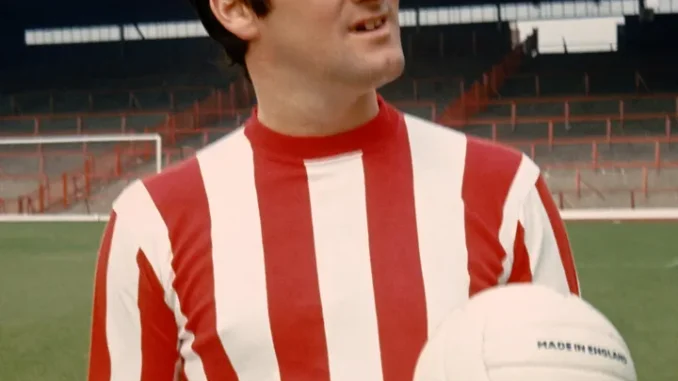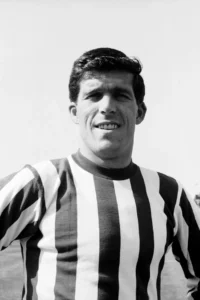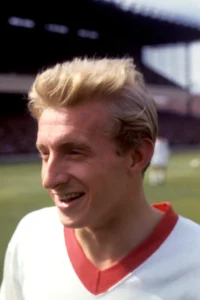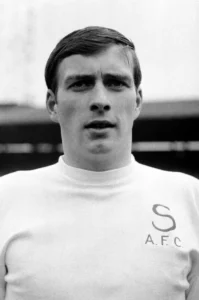
On This Day (8 Jan 1966): Moore and Elliott stake a claim in Old Trafford cracker!
With a slew of players injured, Sunderland seemed to be easy prey for the Red Devils, but Kelvin Beattie goes into the archives to find out why.
Our second season in Division One, with Ian McColl at the helm, had not gone as planned.
Our home record has resulted in a couple of devastating losses, the most recent being a 1-5 loss to West Bromwich Albion on New Year’s Day. We had given our renowned opponents a good game at Roker Park in December, losing 3-2, but we had played with our full team, which included Charlie Hurley, Jim Baxter, and Neil Martin.
We had just won 2-0 at home against Newcastle, with to goals from George Herd and John O’Hare, but the team had been ravaged by sickness and injuries, and our thirteen healthy senior players had all flown to Old Trafford, with Hurley, Baxter, Martin, and John Parke notable absentees.
The defense was forced to rearrange, with Jimmy McNab at center back, Tantobie’s Dave Elliott at half back, and Cec Irwin at right back.
Nick Sharkey was healthy again and started on the bench, with Mike Hellawell filling in on the right flank, and the squad that took the field had eight players who had been through our junior system.
Manchester United had no such challenges.
The return of Bobby Charlton to the starting lineup after a midweek training injury with England was a pleasant surprise for United, but not so wonderful for us. John Aston replaced Terry Connelly on the left side, giving the Red Devils plenty of speed down both wings, while George Best was picked on the right.
With the attendance topping 40,000 and United vying for the championship, most predicted an easy United win. Alf Greenly wrote in The Journal that ‘Sunderland had acquired a lot of supporters who were all in fine voice’.
Herd and Irwin worked well together to ease some early United pressure as Aston pushed to make a mark, but Herd was forced back into mostly defensive responsibilities for the majority of the half as the Red Devils attempted to turn the screw.

David Herd then beautifully connected with Best to bring him through on goal, but Jimmy Montgomery was out in a flash and beat him to the ball.
Montgomery had been in excellent form since recovering from an ankle injury in early October 1965, and he would have a superb game, making two outstanding stops in the first half to prevent Best from scoring a hat trick inside fifteen minutes.
As it was, he couldn’t stop Best from scoring off a great play begun by full back Tony Dunne on eight minutes, when he raided down the right side. Leaving Len Ashurst in no-man’s land, he played a brilliant one-two with Best, who blasted past Monty and into the corner of the goal to give United the lead.
Sunderland were pressed back and under a lot of pressure, but McNab looked to enjoy the task, and Harvey and Elliott joined him in delivering excellent first-half displays.
In the first half, United supporters chanted for penalties three times.
One of them seemed to be a fair call, as McNab appeared to sweep the ball away with his hand, but no reward was given despite the referee’s near proximity. The other two penalty calls left the referee unfazed by what Greenly described as ‘histrionics’ as Herd and Denis Law were found to have dived!

Law and Best were fortunate not to be penalized by the referee after raising their fists in reaction for forceful but valid challenges from Elliott (on Law) and Moore (on Best). Nobby Stiles also planted a classic foot on Montgomery, which referee Denis Corbett, despite having a clear view, opted to overlook.
After withstanding virtually continuous pressure for the whole of the first half, Sunderland burst out and nearly equalised twice shortly before halftime.
Harry Gregg, United’s goalkeeper, diverted Herd’s ferocious strike, which Law ultimately cleared. Almost immediately, rangy young center striker Gary Moore sent a shot toward goal that Gregg stopped at full stretch.
Moore, who was born in Sedgefield, went on to have an excellent 90 minutes, exhibiting endurance, strength, and talent against a very seasoned United defense.
While the first half was mostly one-way traffic, Sunderland took control of Aston and Best in the second half, as well as bringing Hellawell and Mulhall into the game.
The second half was much more level, with the Lads going close to equalizing a number of times before ultimately tying the game, and the goal was a cracker.
On the 62nd minute, Herd moved the ball smartly out of defense and found Moore on the right flank with acres of room. He surged forward and blasted a deadly low cross into the box, forcing Bill Foulkes to bubble up into the air.
Moore had not stopped sprinting, and despite being wedged between two United players, he was able to get his head to the ball and guide it to the far post, where O’Hare responded quickly, diving full length to deflect the ball beyond Gregg.

Following the equalizer, a ding dong game proceeded, with both sides dominating for spells of time and coming close. Sunderland put up an energetic and enthusiastic effort, ‘playing their guts out to win a point’, as Greenly would write in The Journal.
Moore, Herd, and O’Hare excelled in attack; McNab and Elliott performed well throughout, with Elliott refusing to be scared by Law’s explosive brilliance. Montgomery also merits particular recognition for several outstanding saves and fast work off his line.
The result put United in fourth place, eight points behind leaders Liverpool, while Sunderland moved up one spot to fifteenth.
Unfortunately, our season did not improve enough, and after a five-game losing streak in February, we finished twentieth in Division One, three points above the drop zone!
Moore, who played so brilliantly that day, only made fourteen appearances for Sunderland, scoring two goals in five years.
He went on to have a successful career in the lower leagues, notably with Southend United, where he scored 46 goals in 144 appearances. He also scored for Chester City in the League Cup semi-final against Aston Villa in 1975, before retiring due to injury in 1978.
Elliott, like Moore, asserted a claim for a regular start in this game, although he played on the left half, which is Baxter’s preference.
He would play 35 games over a three-year span beginning in February 1964, before moving to Newcastle and then, very swiftly, to Southend United, where he played alongside Moore, playing in one hundred and ninety games.

Leave a Reply